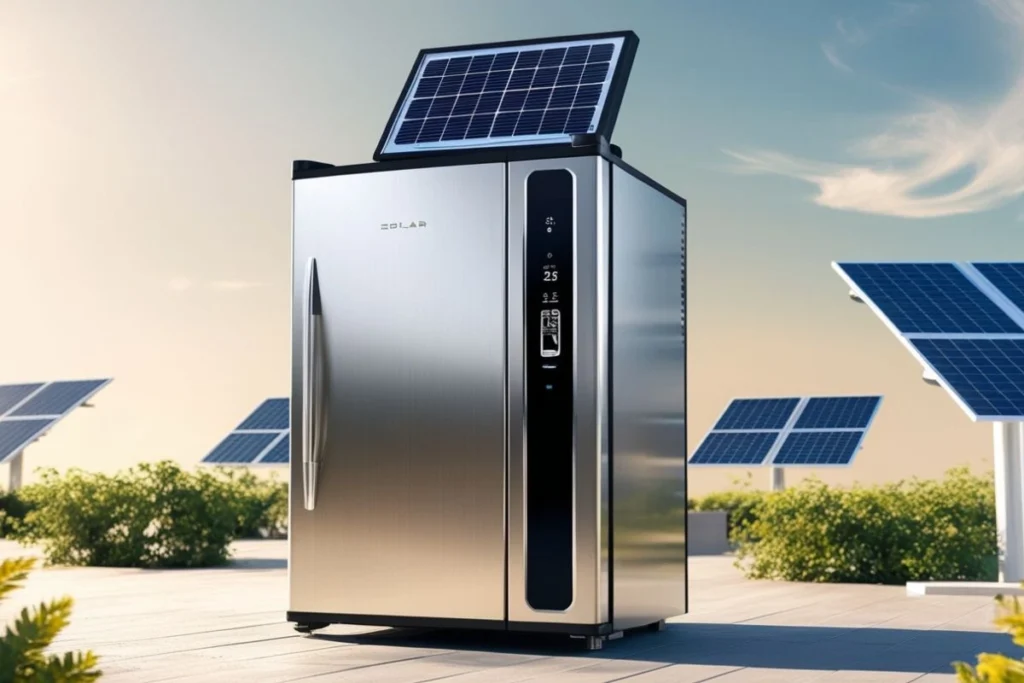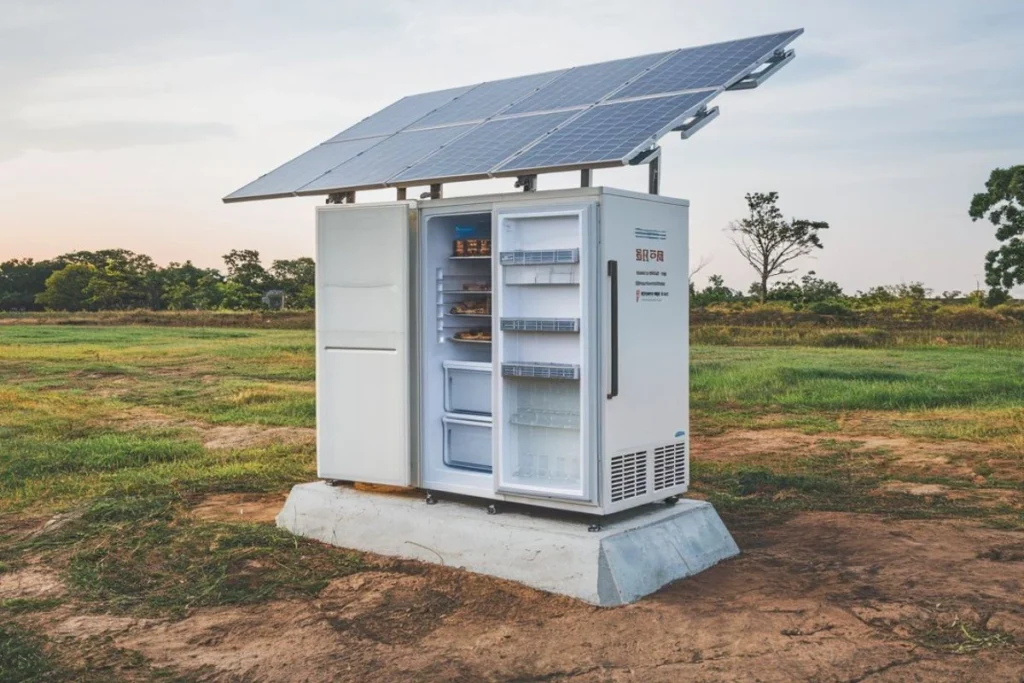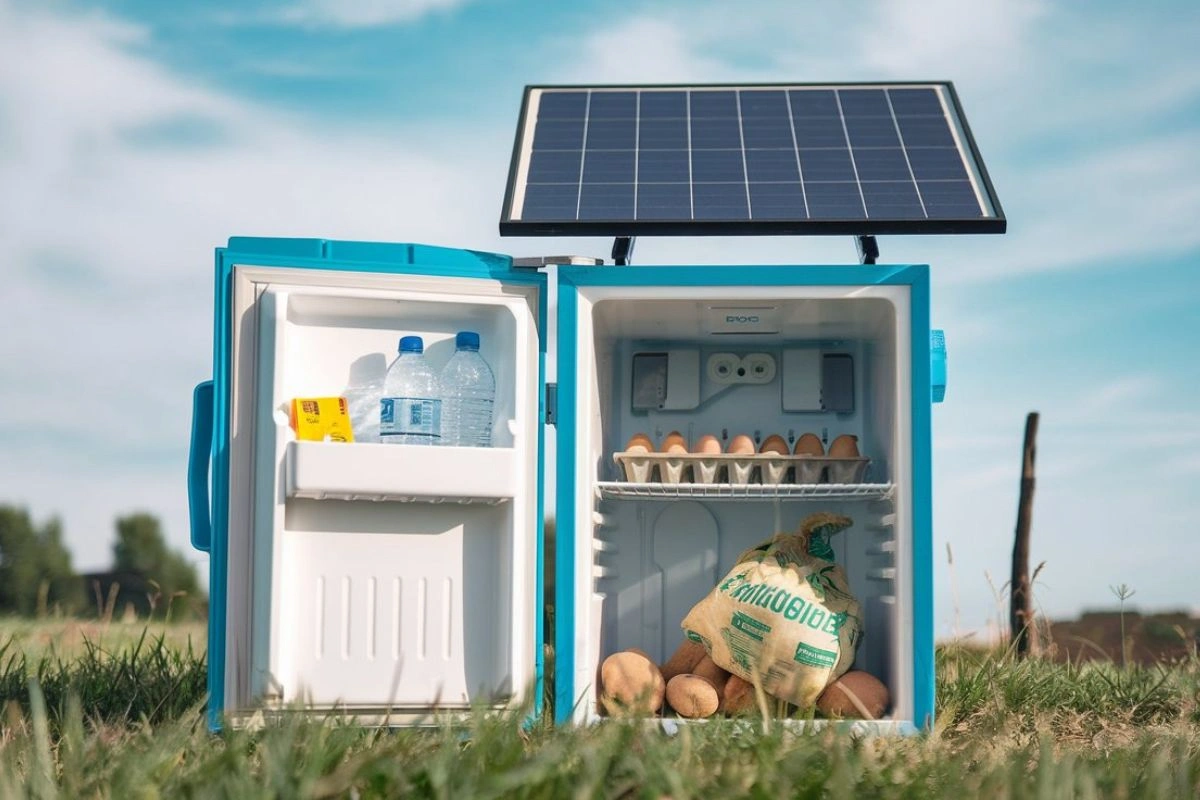In a rapidly evolving world where sustainability is at the forefront of technological innovation, the solar energy fridge stands out as a transformative solution. Combining the clean power of solar energy with the essential utility of refrigeration, solar energy fridges are revolutionizing how people in both urban and rural areas approach cooling solutions.
This innovation is particularly impactful for off-grid communities, healthcare systems, and regions affected by unreliable electricity. With the rise in global energy demands and the pressing need to combat climate change, solar energy fridges offer an environmentally friendly and practical solution.
What is a Solar Energy Fridge?
A solar energy fridge is a refrigeration unit powered by solar energy, derived from photovoltaic (PV) panels. Unlike conventional fridges that rely on electricity from the grid, solar energy fridges function independently, storing solar power in batteries for uninterrupted cooling even during cloudy days or at night.
These devices are designed to minimize energy consumption while providing reliable performance, making them an excellent choice for areas where grid electricity is either unavailable or unreliable.
How Do Solar Energy Fridges Work?
- Solar Panels Capture Energy:
Solar energy fridges begin their operation by capturing sunlight through PV panels. and transform it into direct current electricity. - Energy Storage in Batteries:
The electricity generated is either used directly to power the fridge or stored in batteries. These batteries ensure the fridge remains operational during the night or on cloudy days, maintaining a steady internal temperature. - Efficient Cooling Mechanisms:
Solar energy fridges often employ advanced insulation and cooling systems designed to consume minimal energy while achieving optimal cooling. Modern units may also use phase-change materials that store and release cooling energy efficiently. - Smart Monitoring Systems:
Many solar fridges today are equipped with smart technologies that allow users to monitor energy consumption, temperature, and battery health remotely, ensuring consistent performance.
Why Solar Energy Fridges Are Essential
The development of solar energy fridges addresses several critical challenges:
1. Energy Access in Off-Grid Areas
Globally, over 700 million people live without reliable access to electricity. For these communities, the lack of refrigeration often means food spoilage, limited healthcare options, and reduced economic opportunities. Solar energy fridges provide a sustainable cooling solution that doesn’t rely on centralized power grids.

2. Environmental Sustainability
Traditional refrigeration relies on grid electricity, much of which is generated using fossil fuels. This leads to the release of greenhouse gases and intensifies climate change. Solar energy fridges, powered by renewable energy, eliminate the carbon footprint associated with conventional refrigeration.
3. Cost Efficiency
While the initial cost of a solar fridge system might seem high, it pays off over time through savings on electricity bills and reduced food waste. With regular upkeep, these systems can remain functional for years, offering a substantial return on investment.
4. Supporting Public Health
In healthcare, refrigeration is critical for storing vaccines, medicines, and blood supplies. For rural clinics and disaster relief efforts, solar energy fridges ensure lifesaving supplies remain effective, even in areas with no electricity.
Key Benefits of Solar Energy Fridges
1. Environmental Impact
Solar fridges help reduce reliance on fossil fuels, minimizing greenhouse gas emissions. By using renewable energy, they contribute to cleaner air and a healthier planet.
2. Accessibility in Remote Areas
Solar-powered fridges are a game-changer for remote regions where traditional refrigeration isn’t feasible. They enable food preservation and healthcare services in places where electricity infrastructure is weak or non-existent.
3. Long-Term Cost Savings
The one-time cost of installation is offset by years of energy savings. With minimal operational expenses, solar fridges are an economical solution in the long run.
4. Food Security and Waste Reduction
By keeping food fresh for longer periods, solar fridges help reduce food waste—a critical issue in many developing countries. This not only saves resources but also ensures families have reliable access to nutritious food.
5. Promoting Energy Independence
Solar energy fridges enable individuals and communities to generate their own electricity, decreasing reliance on external power sources and enhancing self-sufficiency.
Applications of Solar Energy Fridges
The versatility of solar energy fridges makes them suitable for various applications:
1. Healthcare
One of the most impactful uses of solar fridges is in healthcare. Vaccines, medicines, and blood products require specific temperature conditions to remain effective. Solar energy fridges have been deployed by organizations like UNICEF and the World Health Organization to store vaccines in remote clinics, particularly during vaccination campaigns for diseases like polio and measles.
2. Disaster Relief
Natural disasters often disrupt power grids, leaving communities without access to refrigeration. Solar energy fridges are invaluable in such scenarios, ensuring emergency supplies, food, and medicines remain preserved.
3. Agriculture and Fishing
Farmers and fishers can use solar fridges to store their products, extending their shelf life and reducing post-harvest losses. This is especially critical in regions where high temperatures accelerate spoilage.
4. Residential and Commercial Use
From households in rural areas to small businesses in developing regions, solar energy fridges provide reliable cooling for daily needs, empowering economic growth and improving quality of life.
Challenges of Solar Energy Fridges
While solar energy fridges have transformative potential, certain challenges must be addressed for wider adoption:
1. High Initial Costs
The upfront cost of solar panels, batteries, and specialized refrigeration units can be a barrier for low-income communities. However, initiatives providing subsidies and financing options are helping to mitigate this challenge.
2. Maintenance Requirements
Solar panels need regular cleaning to maintain efficiency, and batteries may require replacement after several years. Lack of technical knowledge in some areas can hinder proper maintenance.
3. Weather Dependence
Although batteries store energy for cloudy days and nighttime use, prolonged periods of poor sunlight can reduce the effectiveness of solar fridges. Innovations in energy storage are addressing this issue but are not yet universally affordable.
4. Limited Awareness
Many people are unaware of the availability and benefits of solar energy fridges. Increased education and awareness campaigns are necessary to drive adoption.
Innovations Driving Solar Fridge Technology
Technological advancements are enhancing the efficiency and accessibility of solar energy fridges:
1. Improved Energy Storage
Next-generation batteries, such as lithium-ion and solid-state options, are providing longer-lasting and more reliable energy storage solutions.
2. Smart Technologies
The integration of Internet of Things (IoT) technologies allows users to monitor performance, detect issues, and optimize energy usage remotely.
3. Modular Designs
Portable and modular solar fridges are making it easier to deploy these systems in remote or emergency settings.
4. Advanced Cooling Mechanisms
Innovations such as thermoelectric cooling and phase-change materials are enhancing the energy efficiency of solar fridges, ensuring consistent performance even under challenging conditions.
5. Global Projects
Programs like SolarChill, supported by UNICEF and other international organizations, are delivering solar-powered vaccine fridges to developing countries, improving healthcare outcomes for millions.

The Future of Solar Energy Fridges
As solar energy continues to develop, the potential for solar-powered refrigeration is expanding. Declining costs of solar panels and batteries, coupled with growing global awareness of renewable energy’s benefits, are driving adoption.
In the future, solar energy fridges may become a standard feature in homes and businesses worldwide. Their role in reducing greenhouse gas emissions aligns with international efforts to combat climate change, including the Paris Agreement and the United Nations’ Sustainable Development Goals (SDGs).
Furthermore, as technological innovations make solar fridges more affordable and efficient, they will play a pivotal role in improving global food security, healthcare access, and disaster resilience.
Conclusion
Solar energy fridges are more than a technological breakthrough—they are a beacon of hope for a sustainable future. By combining renewable energy with essential refrigeration, these devices are addressing critical challenges in healthcare, food security, and environmental protection.
Whether you’re a policymaker, an entrepreneur, or an individual consumer, investing in solar energy fridges is a step toward a cleaner, greener, and more equitable world. As we embrace renewable energy solutions, solar-powered refrigeration stands out as a shining example of how technology can improve lives while protecting the planet.

